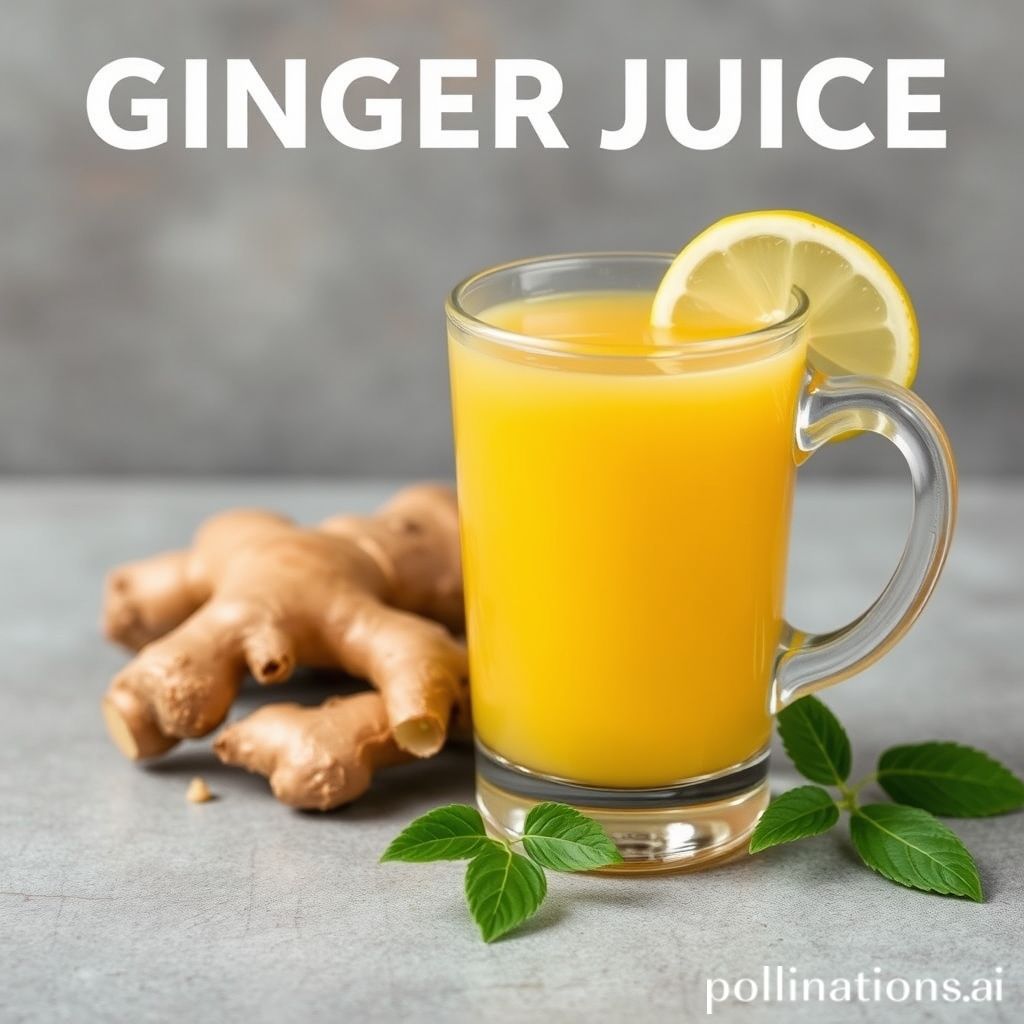Boost Your Health Naturally with Ginger Juice: Unveiling its Amazing Benefits
[su_note note_color=”#fb8e00″ text_color=”#000000″ radius=”12″]
Ginger juice is gaining popularity as a health elixir, and for good reason! Packed with powerful antioxidants and anti-inflammatory properties, this potent juice offers a wide range of health benefits. From aiding digestion and reducing nausea to boosting the immune system and supporting weight loss, ginger juice is a natural remedy with numerous advantages.
Additionally, its unique flavor adds a refreshing kick to your daily routine. So, if you’re curious about the positive impact ginger juice can have on your well-being, read on to discover its incredible health benefits and potential risks. Let’s dive into the world of ginger juice!
[su_box title=”
[/su_box]

Mastering the Nutritional Value of Ginger Juice
1. Essential Nutrients Found in Ginger Juice
Ginger juice contains several essential nutrients that contribute to its health benefits. One crucial component is gingerol, a bioactive compound known for its powerful antioxidant and anti-inflammatory properties. Gingerol gives ginger its distinct flavor and aroma and is believed to offer numerous health benefits. Additionally, ginger juice is rich in vitamins and minerals like vitamin C, vitamin B6, magnesium, and potassium, which are important for maintaining overall health and wellbeing.
2. Antioxidant Properties of Ginger Juice
Ginger juice is known for its high antioxidant content, which helps protect the body against harmful free radicals. Antioxidants are substances that neutralize unstable molecules called free radicals, which can cause oxidative stress and damage to cells. Regular consumption of ginger juice can boost the body’s antioxidant defenses and reduce the risk of chronic diseases such as heart disease, cancer, and neurodegenerative disorders.
3. Anti-inflammatory Benefits of Ginger Juice
Ginger juice also offers significant anti-inflammatory properties, which contribute to its health benefits. Chronic inflammation is associated with various health conditions, including arthritis, diabetes, and cardiovascular diseases. Ginger juice contains compounds called gingerols and shogaols, which have been shown to inhibit inflammatory pathways in the body. By regularly consuming ginger juice, you may help reduce inflammation, alleviate pain, and improve joint health overall.
[su_highlight background=”#f6b40f”]Expert Tips:
1. Boost your health with ginger juice’s antioxidant and anti-inflammatory properties.
2. Protect against chronic diseases by regularly consuming ginger juice.
3. Improve joint health and reduce inflammation with ginger juice’s anti-inflammatory benefits.[/su_highlight]
Health Benefits of Drinking Ginger Juice
Ginger juice offers a range of health benefits that can positively impact various aspects of your well-being. Here are some key advantages:
1. Boosts Immune System
- Enhances immune response: Ginger juice contains antioxidants and bioactive compounds that strengthen your immune system, enabling it to better combat illnesses and infections.
- Fights against infections: The antimicrobial properties of ginger juice make it effective in fighting various bacterial and viral infections.
2. Improves Digestion
- Relieves indigestion and bloating: Ginger juice aids digestion and reduces symptoms of indigestion and bloating. It stimulates the production of digestive enzymes, promoting better nutrient absorption.
- Soothes stomach discomfort: Consuming ginger juice provides relief from stomach discomfort, including stomachaches and cramps.
3. Relieves Nausea and Vomiting
- Effective for morning sickness: Ginger juice is a popular remedy for pregnant women experiencing morning sickness. Its natural compounds alleviate nausea and vomiting.
- Alleviates chemotherapy-induced nausea: Cancer patients undergoing chemotherapy often experience nausea as a side effect. Ginger juice reduces chemotherapy-induced nausea and improves overall well-being.
4. Reduces Muscle Pain and Soreness
- Anti-inflammatory effects on muscles: The anti-inflammatory properties of ginger juice reduce muscle pain and soreness, making it beneficial for athletes and individuals with exercise-induced discomfort.
- Relieves exercise-induced pain: Regular consumption of ginger juice helps relieve muscle pain and soreness caused by intense physical activity.
5. Supports Cardiovascular Health
- Lowers blood pressure: Ginger juice has a positive impact on blood pressure levels, helping to lower high blood pressure and reduce the risk of heart disease.
- Reduces cholesterol levels: Consuming ginger juice contributes to lower cholesterol levels, promoting a healthier cardiovascular system.
Incorporating ginger juice into your diet can provide you with these health benefits and more. Despite this, it’s important to consult with a healthcare professional before making any significant changes to your diet, especially if you have any underlying health conditions or are taking medications.
Health Benefits of Drinking Ginger Juice
| Health Benefits of Drinking Ginger Juice |
|---|
| Boosts immune system |
| Improves digestion |
| Relieves nausea and vomiting |
| Reduces muscle pain and soreness |
| Supports cardiovascular health |
Potential Risks and Side Effects of Ginger Juice
1. Allergic Reactions
Ginger juice can potentially cause allergic reactions in some individuals. It is important to be aware of the following:
- Allergy symptoms: Allergic reactions to ginger juice may include skin rash, itching, swelling, or difficulty breathing.
- Precautions: If you have a known allergy to ginger or related substances, it is advisable to avoid consuming ginger juice.
- Consult a healthcare professional: Seek medical attention immediately if you experience any allergic reactions after consuming ginger juice.
2. Interactions with Medication
Ginger juice may interact with certain medications, potentially affecting their efficacy or causing adverse effects. Consider the following:
- Blood-thinning medications: Ginger juice may enhance the effects of blood-thinning medications, such as aspirin or warfarin, increasing the risk of bleeding. Consult your healthcare provider if you are taking such medications.
- Antidiabetic medications: Ginger juice may lower blood sugar levels, which can be problematic for individuals taking antidiabetic medications. Regular monitoring of blood sugar levels is essential in such cases.
- Consult a healthcare professional: If you are taking any medications, including over-the-counter drugs, herbal supplements, or prescribed medications, consult with your healthcare provider before consuming ginger juice.
3. Stomach Upset or Heartburn
Ginger juice may cause stomach upset or heartburn, especially when consumed in excessive amounts or by individuals with sensitive stomachs. Consider the following:
- Dosage and moderation: Consume ginger juice in moderation and avoid excessive intake, especially if you have a history of stomach ulcers, acid reflux, or digestive disorders.
- Individual tolerance: Some individuals may be more sensitive to the spicy nature of ginger, which can lead to stomach discomfort or heartburn. Adjust the amount of ginger juice consumed according to your tolerance.
- Consult a healthcare professional: If you experience persistent stomach upset or heartburn after consuming ginger juice, consult your healthcare provider for proper evaluation and guidance.
In the course of ginger juice offers numerous health benefits, it is essential to be aware of the potential risks and side effects associated with its consumption. If you have any concerns or pre-existing medical conditions, consult with a healthcare professional before incorporating ginger juice into your diet.

How to Incorporate Ginger Juice into Your Diet
1. Freshly made ginger juice recipes
To incorporate ginger juice into your diet, you can make it fresh at home. Here are a few recipes to try:
- Ginger Lemonade: Squeeze the juice of one lemon and mix it with one tablespoon of freshly grated ginger juice. Add honey and water to taste, and enjoy a refreshing and healthy drink.
- Ginger Shots: Mix one to two tablespoons of ginger juice with a dash of lemon juice and a pinch of black pepper. Take this concentrated shot in the morning to start your day with a boost of energy.
- Ginger Infused Water: Add a few tablespoons of ginger juice to a pitcher of water and let it infuse for a few hours. This infused water not only adds flavor but also provides numerous health benefits.
2. Adding ginger juice to smoothies or teas
If you enjoy smoothies or teas, you can enhance their flavor and health benefits by adding ginger juice. Here are some ideas:
- Ginger Green Smoothie: Blend a handful of spinach, a ripe banana, a tablespoon of ginger juice, and your choice of milk or yogurt. This refreshing smoothie is packed with nutrients and has a zesty kick from the ginger.
- Ginger Turmeric Tea: Brew a cup of your favorite herbal tea and add a tablespoon of ginger juice along with a pinch of turmeric. Stir well and enjoy the warm and soothing flavors of this immune-boosting beverage.
3. Using ginger juice as a marinade or dressing
Ginger juice can also be used as a flavorful marinade or dressing for your favorite dishes. Here are a couple of ideas:
- Ginger Soy Marinade: Combine ginger juice, soy sauce, garlic, and a touch of honey to create a delicious marinade for chicken, fish, or tofu. Let the ingredients infuse together for a few hours before cooking to enhance the flavors.
- Ginger Sesame Dressing: Whisk together ginger juice, sesame oil, rice vinegar, and a pinch of salt to create a versatile dressing for salads or drizzling over steamed vegetables.
When using ginger juice in recipes, start with small amounts and adjust according to your taste preferences. Enjoy the health benefits and delightful flavors that ginger juice brings to your meals and beverages.
| Information |
|---|
| Ginger juice can be made fresh at home using a juicer or by grating and squeezing ginger. |
| Consult with a healthcare professional before consuming ginger juice if you have any underlying health conditions or are taking medications. |
| Excessive intake of ginger juice may cause digestive discomfort or interact with certain medications, so moderation is key. |
[su_note note_color=”#ea2e0c” text_color=”#ffffff” radius=”8″]Extra Tips: Start with small amounts of ginger juice, consult a healthcare professional, and moderate your intake for optimal health benefits.[/su_note]
Tips for Buying and Storing Ginger for Juice
1. How to Choose Fresh and Quality Ginger
When purchasing ginger for juicing, it is important to choose fresh and high-quality ginger to ensure you receive the maximum health benefits. Look for ginger roots that are firm, smooth, and free from any mold or blemishes. Thin and shiny skin indicates freshness. Avoid ginger roots that are soft, wrinkled, or have a strong smell, as these may indicate spoilage.
Additionally, select plump and heavy ginger roots, as they indicate juiciness. You can also gently squeeze the ginger to check if it feels firm and dense, which is a sign of freshness. Organic ginger is a great option as it is free from pesticides and chemicals.
2. Proper Storage to Maintain Freshness
Proper storage of ginger is crucial to maintain its freshness and flavor for juicing. After purchasing ginger, store it in a cool, dry, and well-ventilated place. Avoid refrigeration, as the moisture can make it damp and moldy.
An effective method for storing ginger is to keep it in a paper bag or airtight container at room temperature. This helps retain its moisture and prevent it from drying out. If you have a large amount of ginger, you can also freeze it for long-term storage. Simply peel and grate the ginger, then place it in an airtight container or freezer bag.
Remember to label and date the container to keep track of its freshness. Frozen ginger can be added directly to juices without the need for thawing, by placing it in the blender or juicer.
Conclusion
Ginger juice has gained popularity due to its numerous health benefits. Through inclusion ginger juice into your daily routine, you can experience improvements in various aspects of your health.
From boosting digestion and reducing inflammation to enhancing immunity and relieving nausea, ginger juice offers a wide range of advantages. Nonetheless, it is important to consume it in moderation and consult with a healthcare professional if you have any underlying health conditions. Overall, adding ginger juice to your diet can be a simple and effective way to enhance your overall well-being.
Faq about the Health Benefits of Ginger Juice
FAQ 1: Can ginger juice help with weight loss?
Ginger juice has been found to aid in weight loss. It can boost metabolism, increase fat burning, and suppress appetite. Nevertheless, it is important to note that ginger juice alone cannot lead to significant weight loss. It should be combined with a balanced diet and regular exercise for optimal results.
FAQ 2: Is ginger juice safe for pregnant women?
Pregnant women should exercise caution when consuming ginger juice. In the course of ginger is generally considered safe during pregnancy, it is advisable to consult with a healthcare professional before including it in your diet. Excessive consumption of ginger juice may cause uterine contractions, leading to complications.
FAQ 3: Can ginger juice be consumed by individuals with diabetes?
Yes, ginger juice can be consumed by individuals with diabetes. Ginger has been shown to help control blood sugar levels and improve insulin sensitivity. Nevertheless, it is important to monitor blood sugar levels closely and consult with a healthcare professional for personalized advice on ginger juice consumption.
FAQ 4: How much ginger juice should be consumed daily for health benefits?
The recommended daily intake of ginger juice for health benefits varies. It is generally recommended to start with small amounts, such as 1-2 teaspoons, and gradually increase if tolerated well. Nevertheless, individual needs and tolerance may vary, so it’s best to consult with a healthcare professional for personalized advice.
FAQ 5: Are there any alternatives to ginger juice for similar health benefits?
Yes, there are alternative ways to enjoy the health benefits similar to ginger juice. Fresh or dried ginger can be added to meals, teas, or smoothies. Additionally, ginger supplements in capsule or powder form are available. Nevertheless, it’s important to note that the concentration of active compounds may vary in different forms, so it’s advisable to consult with a healthcare professional for personalized recommendations.
Read Similar Post:
1. Preserving Freshness: The Shelf Life of Refrigerated Ginger Juice
2. Effortlessly Blend Ginger into Refreshing Juice: Step-by-Step Guide

